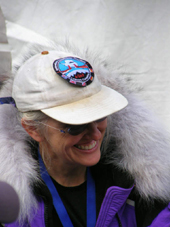Robin Bell is at Columbia University’s Lamont-Doherty Earth Observatory where she studies large subglacial lakes, hidden mountains and ice sheet stability. She is passionate about understanding how our planet works and engaging a new generation of scientists to work on change and adaptation.
At dinner last week sister announced that she was appalled that I was ruining the Antarctic environment with my science. The good news is I did not hear her and dinner proceeded without incident. The bad news is that she is a highly educated elected official from a very liberal very green state. We as scientists have failed to adequately articulate why science is important so that few understand the scientific process and what it contributes to society at large.
Science is important because it is a truly global process where the human species seeks to understand how things work. Scientists pursue questions of how things work that range from the sub-atomic particle zipping through my coffee cup, to the metaphysics of baboons to the origin of ice-covered mountain ranges. Often the motivation is curiosity but the net result is expanding our collective knowledge and understanding. This process based knowledge and understanding is crucial to the long-term survival of our species as a society.
In our interconnected planet this quest for knowledge reaches across borders, continents and oceans. This global network of collaborating scientists is a tremendous foil to insularity that occasionally overcomes our nations. The 9/11 terrorist attacks illustrated to me the strength and importance of the network. While my neighborhood was reeling from the dozens of deaths and the reaction was to withdraw and look inward, I found my global science community reaching out. From the support of this network I was able to counter much of the tendency for insularity produced by the post-9/11 fear in the New York City region.
I am on my way to Antarctic to explore the last unexplored mountain range on earth. This two-month program is the culmination of eight years of planning and collaboration from scientists around the globe. While I have not yet convinced all my family that this science is important, exploring the Gamburtsev Mountains and the surrounding subglacial lakes embodies my drive to understand how the icy parts of our planet work. Working together our team from six nations will advance our basic understanding of how much ice is stored in Antarctica and how stable are the ice sheets. The knowledge we hope to gain will be crucial to constraining models of future changes in sea level. Perhaps when I get back at another dinner I can try again to explain why science is important to my sister.
 Published by
Published by